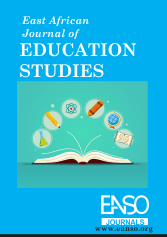Relationship between Grit, Academic Emotions, and Academic Achievement of Secondary School Students in Kiambu County, Kenya
Abstract
The purpose of this study was to examine the relationship between grit and academic emotions in predicting academic achievement among secondary school students. A random sample of 258 form three students (127 Males and 131 Females) was chosen from public secondary school students in Kiambu County, Kenya. The study used an explanatory sequential mixed methods study design, and data were collected using self-report questionnaires. Validity and reliability measures were established with appropriate adjustments made to the questionnaires. Academic achievement was obtained from an analysis of the students’ examination records. To examine relationships, the study used the Pearson product-moment correlation method, while the t-test for independent samples was used to determine gender differences between students’ grit and academic emotions. Thematic analysis was applied to qualitative data to correlate the findings from the quantitative analysis. Results revealed that the two variables, grit and academic emotions, significantly influence academic achievement, while there was no significant gender difference between them. The study recommended that all educational stakeholders should focus on strategies that enhance non-cognitive skills in teaching and learning, such as grit and emotional regulation, and that they should also enhance students’ sense of control over their academic pursuits
Downloads
References
Alamer, A. (2021). Grit and language learning: construct validation of the L2-Grit scale and its relation to later vocabulary knowledge. Educ. Psychol. 41, 544–562. doi: 10.1080/01443410.2020.1867076
Bevolo, M., & Blaise, J. O. (2022). Towards mobilizing educators as environmental ambassadors: a design research approach to inspire teachers to advocate sustainable futures. On the Horizon, 30(2), 82- 95. doi:https://doi.org/10.1108/OTH-06-2021-0071
Braun, V., & Clarke, V. (2006). Using thematic analysis in psychology. Qualitative Research in Psychology, 3(2), 77–101. https://doi.org/10.1191/1478088706qp063oa
Bryman, A. (2016). Social research methods (5th ed.). Oxford University Press.
Creswell, J. W., & Plano Clark, V. L. (2018). Designing and conducting mixed methods research (3rd ed.). SAGE Publications.
Morse, J. M. (2010). Procedures and practice of mixed method design: Maintaining control, rigor, and complexity. International Journal of Qualitative Methods, 9(4), 271–283.
Chitpin, S. (2021). Great Expectations: The Achievement Gap in English Schools. Understanding Decision-Making in Educational Contexts, 4(1), 65-83. doi: https://doi.org/10.1108/978-1-80071-817-320211005
Christopoulou, M., Lakioti, A., Pezirkianidis, C., & Karakasidou, E. (2018). The Role of Grit in Education: A Systematic Review. Psychol-ogy, 9(1), 2951- 2971. doi:https://doi.org/10.4236/psych.2018.915171
Creswell, J. W., & Poth, C. N. (2018). Qualitative inquiry and research design: Choosing among five approaches (4th ed.). SAGE Publications.
Duckworth, A. L., Peterson, C., Matthews, M. D., & Kelly, D. R. (2007). Grit: Perseverance and Passion for Long-Term Goals. Journal of Personality and Social Psychology, 92, 1087-1101. https://doi.org/10.1037/0022-3514.92.6.1087
Eksterowicz, H. (2020). The relationship between locus of control, gender, and academic achievement. Journal of Education, 5(2), 30-41. doi:https://rdw.rowan.edu/etd/1793
Essin, O. (2021). The Relationship Between Grit And Emotional Intelligence In University Students. Psycho-educational research review, 3(1), 25-33. Retrieved from https://files.eric.ed.gov/fulltext/EJ1300239.pdf
Fernández, R. G., & Brenlla, M. E. (2022). Past-Positive time perspective predicts academic achievement via motivation, and procrastination might not be as bad as it seems. Journal of Applied Research in Higher Education, 4(2): 33- 46. doi:https://doi.org/10.1108/JARHE-11-2021-0413
Hanushek, E. A., & Woessmann, L. (2020). Education, knowledge capital, and economic growth. International Encyclopedia of Education, 4(1), 1–7.
Khajavy, G. H., & Aghaee, E. (2022). The contribution of grit, emotions, and personal bests to foreign language learning. Journal of Multilingual and Multicultural Development, 3(1), 14- 29. doi:DOI:10.1080/01434632.2022.2047192
KNEC (2018). 2018 KCSE Examination Essential Statistics. KNEC
KNEC (2019). 2019 KCSE Examination Essential Statistics. KNEC
KNEC (2020). 2020 KCSE Examination Essential Statistics. KNEC
KNEC (2021). 2021 KCSE Examination Essential Statistics. KNEC
KNEC (2022). 2022 KCSE Examination Essential Statistics. KNEC
KNEC (2023). 2023 KCSE Examination Essential Statistics. KNEC
New Delhi: New Age International (P) Limited
Lehman, A. N. (2019). The Role of Perceived Academic Control, Preoccupation With failure, and academic emotions on major satisfaction. Illinois State University. Retrieved 8 31, 2022, from https://ir.library.illinoisstate.edu/etd/1105
Mokski, E., Filho, W. L., Sehnem, S., & Salgueirinho, J. B. (2022). Education for sustainable development in higher education institutions: an approach for effective interdisciplinarity. International Journal of Sustainability in Higher Education, 45(3), 1-23. doi:https://doi.org/10.1108/IJSHE-07-2021-0306
Murayama, K., Pekrun, R., & Lichtenfeld, S. (2017). Predicting long-term academic success from motivation and learning strategies. Journal of Educational Psychology, 109(2), 267–284.
Peercy, C., & Svenson, N. (2019). Rethinking Higher Education Investment in Developing Countries. Journal of International Education, 34(1), 39- 47. doi:https://doi.org/10.1108/S1479-367920180000034004
Pekrun, R. (2006). The control-value theory of achievement emotions: Assumptions, corollaries, and implications for educational research and practice. Educational Psychology Review, 18(4), 315–341
Pekrun, R., Goetz, T., Titz, W., & Perry, R. P. (2002). Positive emotions in education. In E. Frydenberg (Ed.), Beyond coping: Meeting goals, visions, and challenges (pp. 149–173). Oxford University Press. https://doi.org/10.1093/med:psych/9780198508144.003.0008
Sudina, E., Brown, J., Datzman, B., Oki, Y., Song, K., Cavanaugh, R., et al. (2020). Language-specific grit: exploring psychometric properties, predictive validity, and differences across contexts. Innov. Lang. Learn. Teach. 15, 334–351. doi: 10.1080/17501229.2020.1802468
Teng, D., Feng, Y.-W., Chen, J.-Y., & Lu, C. (2022). Structural dynamic reliability analysis: review and prospects. International Journal of Structural Integrity, 4(3), 23-45. doi:https://doi.org/10.1108/IJSI-04-2022-0050
Wang, R., Shirvan, M.E., & Taherian, T. (2021). Perseverance of Effort and Consistency of Interest: A Longitudinal Perspective. Front. Psychol. 12:743414.doi: 10.3389/fpsyg.2021.743414
Wei, R., Liu, H. & Wang, S. (2020). Exploring L2 Grit in the Chinese EFL context. System 93, 1–9. doi: 10.1016/j.system.2020.102295
Wigfield A, Gladstone J, Turci L. Beyond Cognition: Reading Motivation and Reading Comprehension. Child Dev Perspect. 2016 Sep;10(3):190-195. doi: 10.1111/cdep.. 12184. Epub 2016 May 23. PMID: 27617030; PMCID: PMC5014370
Lam, K. K. L., & Zhou, M. (2019). Examining the Relationship between Grit and Academic Achievement within K-12 and Higher Education: A Systematic Review. Psychology in the Schools,56,1654-1686. https://doi.org/10.1002/pits.22302
Copyright (c) 2025 Daniel Muigai Mwaura, Josphine Ngina Mutua, PhD, Elizabeth Nduku Mutisya, PhD

This work is licensed under a Creative Commons Attribution 4.0 International License.




























